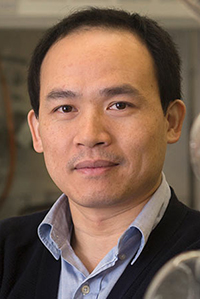Date/Time
Date(s) - 11/29/2021
9:35 am - 10:30 am
Categories
Biwu Ma, Ph.D.
Professor of Chemistry & Biochemistry
Florida State University
Title: Low Dimensional Metal Halide Perovskites and Hybrids: From Material Development to Device Integration
Abstract: Metal halide perovskites and perovskite-related hybrid materials are an emerging class of functional materials with exceptional structural and property tunability. Recently, metal halide perovskites with ABX3structure have been extensively investigated as solution processable semiconductors for various optoelectronic devices, including photovoltaic cells (PVs), light emitting diodes (LEDs), photodetectors, lasers, scintillators, etc. By controlling the morphological dimensionality, low dimensional metal halide perovskites, including 2D nanoplatelets, 1D nanowires, and 0D quantum dots, have been developed to exhibit distinct properties from their 3D counterparts, as a result of quantum size effects. Besides ABX3 perovskites, organic-inorganic metal halide hybrids, containing the same fundamental building block of metal halide octahedra (BX6), can be assembled to possess other crystallographic structures. Using appropriate organic and metal halide components, low dimensional organic metal halide hybrids with layered-2D, quasi-2D, corrugated-2D, 1D, corrugated-1D, and 0D structures at the molecular level have been developed and studied. Due to the strong quantum confinement and site isolation, these molecular low dimensional organic metal halide hybrids exhibit remarkable and unique properties that are significantly different from those of ABX3 perovskites. For instance, broadband white emissions have been recorded in 1D organic metal halide hybrids containing metal halide wires and tubes; and near-unity photoluminescence quantum efficiency (PLQE) has been achieved for a number of 0D organic metal halide hybrids with tunable emissions from blue to green, yellow, orange and red. In this talk, I will present our recent research efforts on the synthesis, characterization, processing, and device integration of low dimensional metal halide perovskites and hybrids. In particular, the use of these materials for highly efficient LEDs with tunable colors as well as X-ray scintillators will be discussed.
Bio: Dr. Biwu Ma is currently a full professor in the Department of Chemistry and Biochemistry at the Florida State University (FSU). He is also a faculty affiliated with the Materials Science and Engineering Program. He received his Ph.D. in Materials Science from University of Southern California in 2006 with research work in OLEDs under the guidance of Prof. Mark Thompson. He then performed postdoctoral research in Plastic Electronics with Prof. Jean Fréchet at the UC Berkeley and Lawrence Berkeley National Laboratory (LBNL) for two and a half years from 2006 to 2008. He began his independent career in June 2008 as a Staff Scientist at the Molecular Foundry at LBNL, and joined FSU in August 2013.
Dr. Ma’s research has been focusing on the development of new functional materials for applications in a wide range of areas from energy to environmental and information technologies. Of particular interest are new generation electronic and energy devices, including light emitting diodes, solar cells, transistors, and sensors. The research activities involve materials synthesis, characterization and processing, device fabrication and testing, as well as theoretical computation and simulation. Material engineering at the molecular level is emphasized to deliver a wide range of advanced functional materials, including organics, organometallics, polymers, and organic-inorganic hybrid materials, in particular metal halide perovskites and perovskite-related materials. Dr. Ma has authored and co-authored more than 100 peer-reviewed publications in high impact journals, with a total of citations of more than 11600 and an H-index of 50 as of today.

